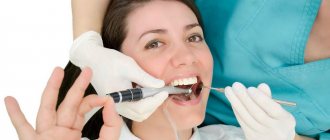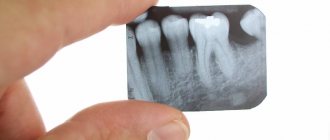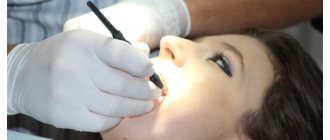According to statistics, about 70% of pregnant women do not visit the dentist. Neglect of treatment is justified by the opinion that anesthesia and dental procedures themselves can harm the fetus and the mother’s body. However, untimely seeking help and foci of infection can cause greater harm: caries, poorly treated root canals, inflammatory processes of the gums, plaque, abscess, periostitis. The neglect of pathological processes is fraught with the entry of microorganisms and their metabolic products into the general bloodstream and the development of a secondary infection.
It is important to remember that it is easier to prevent the disease than to resort to surgical treatment and medication in the future. That is why timely diagnosis and dental treatment during pregnancy is extremely important for maintaining the overall health of the mother and unborn child. In addition, a routine examination by a dentist is included in the list of mandatory examinations when planning pregnancy and during pregnancy.
Features of dental treatment for pregnant women
Dental treatment is a mandatory medical procedure, regardless of whether a woman is preparing to conceive a child or is already pregnant. The dentist’s tactics depend on the trimester of pregnancy, its course, the general somatic health status of the pregnant woman and indications for treatment. Peculiarities of management of pregnant women are characterized by the following features:
Treatment planning
During pregnancy, emergency dental treatment is performed, the indications for which are:
- Carious lesions of hard and soft tissues of teeth: pulpitis, periodontal inflammation (periodontitis).
- Pathological processes of soft tissues of the oral cavity, gums: gingivitis, stomatitis, cheilitis, glossitis, inflammation of periodontal tissues.
- Tooth injuries: fracture of the crown or root of the tooth, dislocation, cracks and chips of the crown part.
- Abscesses.
- Acute purulent inflammation of the jaw bone tissue.
Planned therapy (orthodontic, implantological and orthopedic treatment) is postponed to the postpartum period.
Pregnancy data
Before starting treatment, you should inform your doctor about the duration and course of pregnancy, taking medications prescribed before conception and during pregnancy, and bad habits. These data can significantly affect the treatment plan drawn up by the dentist.
X-ray diagnostics
X-ray examination is extremely undesirable in all trimesters of pregnancy: failures in the formation of fetal cells can lead to irreparable consequences and abnormalities. The 1st and 3rd trimesters are especially dangerous for radiation diagnostics, however, the 2nd trimester is no exception, although it includes lower risks of developing pathology.
Dental filling
When filling teeth, materials of both chemical and light curing are used. Curing lamps used for curing are also not safe for the developing fetus.
Anesthesia
At the present stage of development of dentistry, painkillers are produced that are absolutely harmless to the pregnant woman and the fetus. High-quality anesthesia is half the success of treatment.
We know that it is possible to treat in a certain trimester
Is it possible to do x-rays?
It is not advisable for pregnant women to undergo X-rays, and it is strictly contraindicated in the first trimester. But at a later date, if there is evidence, such a procedure is possible. Fortunately, modern dentistry uses equipment with highly sensitive sensors and minimal radiation. During the examination, the patient’s chest and abdomen are covered with a lead apron.
Attention!
To avoid the risk of complications in the fetus, it is worth taking care of prevention at the stage of pregnancy planning. Before deciding to expand the family, a woman needs to consult a dentist, cure all carious lesions, chronic diseases of the gums and periodontal tissues, and, if necessary, undergo procedures to strengthen tooth enamel. Those who are preparing to become a mother need to pay special attention to hygiene and proper oral care, because during pregnancy the risk of developing caries increases.
Contraindications and limitations to treatment
A contraindication to dental treatment for a pregnant woman is any procedure that can directly or indirectly harm the body and cause premature birth. Such procedures include the following:
Implant treatment
Both healthy fetal development and complete implant healing require large amounts of calcium. During pregnancy, the body is unable to produce enough mineral to support both processes. Even taking vitamin and mineral complexes sometimes does not give the desired effect. Therefore, every gram of calcium counts.
An additional danger during treatment is the need for X-ray monitoring of the implant installation, as well as the prescription of medications during the recovery period. The latter can have a general toxic effect not only on the pregnant woman’s body, but also on the developmental processes of the fetus.
Professional whitening
During bleaching, the enamel is damaged, which due to pregnancy may be somewhat depleted in mineral composition. Due to the fact that most of the calcium produced goes into the fetus's body, it may not be enough to restore the top layer of enamel. The result is increased sensitivity and microcracks.
Prosthetics
Installation of fixed dentures requires special preparation: preparing the tooth and forming a stump for the crown, removing the dental pulp, filling the root canals. The installation of crowns is contraindicated for pregnant women in the 1st and 3rd trimesters. In the 2nd trimester, in emergency situations, removable prosthetics are allowed.
Tooth extraction
Removal of teeth that are not the cause of discomfort (impacted or dystopic) is contraindicated during pregnancy. If there is a possibility of rescheduling the operation and there are no obvious clinical signs (pain, redness and swelling of the gums), then in order to prevent the development of infection, it is better to refuse the procedure before delivery.
Emergency cases requiring immediate tooth extraction:
- Fracture of the root or crown of a tooth.
- Pulpitis of wisdom teeth.
- Carious lesions of the tooth root.
- Periodontitis.
- Tooth root cysts.
- Destruction of more than 50% of the tooth, accompanied by unbearable pain.
Antibacterial therapy
Antibiotics during pregnancy are prescribed strictly according to indications and taking into account the duration of pregnancy. For treatment, those groups of drugs that do not have a teratogenic effect are selected.
When you can't do without dental x-rays
Blind dental treatment is not recommended for anyone, especially expectant mothers. Thanks to an x-ray, the doctor sees the cause of toothache, the location and form of the inflammatory process, and other important nuances.
Diagnostics is prescribed for:
- filling root canals for pulpitis - it is necessary to determine the shape and length of the canal;
- problematic growth of eights;
- formation of cysts, granulomas and other neoplasms;
- suspected periodontitis (inflammation of the periodontal tissues);
- fracture or tooth root injury.
Dental treatment in the I, II and III trimesters
The dentist’s tactics when treating teeth in pregnant women depend on the specific stage of pregnancy - trimester.
Treatment in the first trimester
The first trimester is the time from the 1st to the 13th weeks of pregnancy. This period is characterized by the formation of the rudiments of the organs of the unborn child. At the same time, the placenta does not yet provide adequate protection of the fetus from the influence of factors of the external and internal environment of the mother’s body.
In the first trimester, a pregnant woman is worried about toxicosis, manifested by systematic nausea, short-term vomiting, hypersalivation, slight dizziness, and slight hyperhidrosis. Any, even minor, stress factor can cause a violent reaction in the body, even leading to miscarriage.
In dental treatment, courses of remineralization therapy and professional teeth cleaning without the use of ultrasound are acceptable. Filling, tooth extraction, prosthetics, dental implantation and x-ray diagnostics are contraindicated during this period.
Treatment in the second trimester
The second trimester lasts from the 14th to the 26th week. The placenta in this trimester is fully formed and provides reliable protection for the fetus. Dental treatment carries fewer risks, but still requires consultation with a gynecologist. During this period, you can perform dental fillings, surgical treatment (strictly according to indications), therapy for inflammatory diseases that may worsen by the 3rd trimester or after childbirth, professional removal of dental plaque (hard and soft).
Treatment in the third trimester
The third trimester is the period from the 27th week until birth. During this period, the woman’s body is actively preparing for childbirth, and therefore may be somewhat weakened. A pregnant woman experiences tachycardia, increased breathing, shortness of breath, decreased blood pressure, and increased anxiety. The woman constantly feels tired. Treatment in the 3rd trimester is exclusively emergency. Planned procedures are postponed until the postpartum period.
In all three trimesters, pregnant women are allowed to carry out professional oral hygiene, the method of which will vary depending on the timing of pregnancy and the condition of the body of the expectant mother.
Tooth extraction during pregnancy
It is not advisable to undergo tooth extraction during pregnancy. This is always associated with a heavy burden, both psychological and emotional, as well as physiological - after all, this is a surgical operation. In addition, with such an operation there is a high probability of infection and the development of inflammation, which may require the use of antibiotics, the use of which is extremely undesirable during pregnancy.
Therefore, planned extractions (for example, wisdom teeth) are not carried out during this period, and only emergency extractions are performed, associated with severe acute pain, dangerous inflammatory processes, fracture of the root or neck of the tooth, the formation of a large cyst (more than 1 cm) or a purulent focus of inflammation.
Is it possible to take an X-ray of a tooth?
A lot of questions arise about whether it is possible to take dental x-rays during pregnancy. In the first trimester, X-rays are prohibited. Dental X-rays in the early stages of pregnancy pose a high risk of dangerous effects on the woman’s body and the developing fetus. In the second and third trimester, x-rays can be taken (preferably radiovisiography, characterized by lower radiation intensity) using a protective apron and according to strict indications.
Principles of pain management
Modern painkillers used in dental practice do not penetrate the placenta and do not change uteroplacental blood flow. They include a lower dose of the vasoconstrictor component, while the analgesic effectiveness remains high.
The drugs of choice include:
- Ultracaine.
- Scandonest (Mepivacaine).
- Ubistezin.
- Alfacaine.
It is not advisable to use lidocaine for local anesthesia, as this drug can cause convulsions, pressure changes, severe dizziness, vomiting and muscle weakness. Carrying out pain relief during tooth extraction or therapeutic treatment must be done under strict monitoring of the pregnant woman’s condition – blood pressure, respiratory rate, pulse.
Local anesthetics are not absorbed into the general bloodstream, as they are inactivated by local tissue factors. The entire volume of the anesthetic substance acts only at the site of its injection. Dental treatment during pregnancy under general anesthesia or sedation is strictly contraindicated.
Why might an expectant mother refuse to cleanse?
In addition to medical contraindications, there may be a number of personal reasons why it is recommended to avoid in-office teeth cleaning during pregnancy.
The first factor is purely psychological, but it is also the most important. If a woman is nervous when visiting a dental clinic, then there is no need to carry out cleaning unless indicated (only according to indications). It is impossible to worry the expectant mother, much less make her very nervous and experience discomfort. There are cases when you cannot do without the help of a doctor - with gingivitis, which pregnant women often suffer from, acute pain, caries, etc. Professional cleaning can usually be delayed for several months.
The second important factor is also largely related to the psychological state. If teeth are highly sensitive, even men and women who are not expecting a child are often advised to avoid ultrasonic cleaning. It can make teeth even more sensitive, which will lead to additional stress for the expectant mother.
Carrying out procedures
All dental procedures are carried out after a preliminary consultation with a gynecologist and a general assessment of the need for dental intervention. A thorough examination and high-quality anesthesia are the key to effective treatment of diseases of the hard and soft tissues of the oral cavity.
Regular examination by a dentist and timely prevention of oral diseases are integral components of the health of the mother and fetus. You should not put off visiting a specialist and hope that the problem will solve itself. Modern dentistry has made a big leap in treatment, pain relief and treatment procedures for pregnant women, so if you doubt whether it is worth treating your teeth during pregnancy, then yes, it is definitely worth it.









